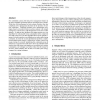Free Online Productivity Tools
i2Speak
i2Symbol
i2OCR
iTex2Img
iWeb2Print
iWeb2Shot
i2Type
iPdf2Split
iPdf2Merge
i2Bopomofo
i2Arabic
i2Style
i2Image
i2PDF
iLatex2Rtf
Sci2ools
126
click to vote
ICCAD
2004
IEEE
2004
IEEE
Optimizing mode transition sequences in idle intervals for component-level and system-level energy minimization
New embedded systems offer rich power management features in the form of multiple operational and non-operational power modes. While they offer mechanisms for better energy efficiency, they also complicate power management decisions in the presence of realtime constraints. Traditional dynamic power management techniques based on localized break-even-time analysis with simple on/off power controls often yield suboptimal if not incorrect results globally. To address these problems, this paper presents two core algorithms for reducing idle energy consumption at the component level and system level. The first algorithm discovers the optimal sequence for mode transition over multiple power modes under timing constraints. It assists the second algorithm that performs a sophisticated global search strategy to aggressively explore system-wide energy savings by correctly interpreting the constraints across all subsystems. Experimental results show that in an embedded radio system where idle ...
| Added | 16 Mar 2010 |
| Updated | 16 Mar 2010 |
| Type | Conference |
| Year | 2004 |
| Where | ICCAD |
| Authors | Jinfeng Liu, Pai H. Chou |
Comments (0)

